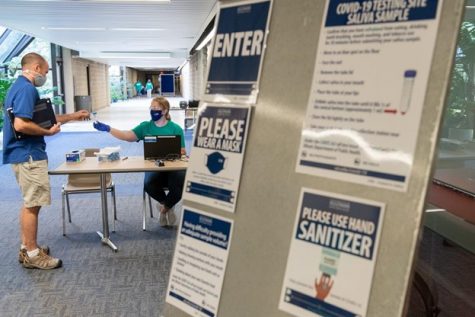Campus Sexual Assault Prevention
Within the Criminal Justice field, sexual assault is a sensitive topic that often leaves victims feeling misunderstood. With March being Women’s History Month, it is crucial that the facts surrounding the experiences that victims have endured are discussed. Of the types of sexual assault experienced, a pertinent variation for college students is the topic of campus sexual assault.
Dr. Leanne Brecklin, Professor for the Criminology and Criminal Justice department at UIS, spoke about the problem of campus sexual assault and the factors which make such crimes more likely. She listed some of the most prevalent factors to be excessive alcohol consumption by individuals involved, drug usage, sense of freedom and related factors. Dr. Brecklin had this to say regarding campus sexual assault risks: “The highest risk for sexual assault is usually in the first three months of a freshman’s start at college…this sense of freedom causes people to go out a little more, party a little more… and a new environment, college students are moving to a new city, a new place…they may not have a big support system…”
UIS has taken note of these factors that can make sexual assault not only more likely, but also increase the likelihood that the victim will not report their assault. The university has responded by providing resources for students on campus to seek information on the legal protections for victims. The Title IX law helps mandate educational institutions such as UIS to enforce policies that prevent sexual misconduct from occurring on campus. There is also the Sexual Misconduct appendix providing clear definitions, instructions and legal information regarding sexual misconduct. It is important to note that professors on campus are all mandated reporters: individuals who must immediately report crimes or concern for potential crimes. Should a student feel that they are in danger, a faculty member would be able to help them report the incident.
When asked what UIS students can do to help prevent sexual assaults on campus, Dr. Brecklin was adamant that there are quite a few things students can do to reduce the number of potential sexual assaults on campus. The first and most important thing to do is to listen. Individuals coming forward about sexual assault are to be taken very seriously and it is valuable to their safety to hear what they are going through, understand their circumstances and refrain from blaming or interrogating them. Dr. Brecklin encourages students to “…think ahead of how you [would] handle [it] if someone disclosed to you…you need to be prepared in case someone shares that with you.” This is important especially since the victim will want to experience unconditional support if ready to talk, and it helps to be ready to provide it.
Speaking up when sexual assault jokes are told is another important way of helping, since jokes like these often mock victim experiences and encourage victim-blaming, both of which make sexual assault more devastating. Dr. Brecklin describes how “UIS has a wide variety of trainings…there’s a rape prevention working ground on campus that was started by [Women’s Center Program Director] Rexann Whorton… and we’re starting to try to get an assessment of all the programs on campus that are working to prevent sexual assault.”
With this in mind, there are always more ways to help. If one is interested in working with UIS to reduce sexual assault prevention, reach out to Dr. Brecklin at [email protected]. There is always an opportunity to promote safety and security in the UIS community.













